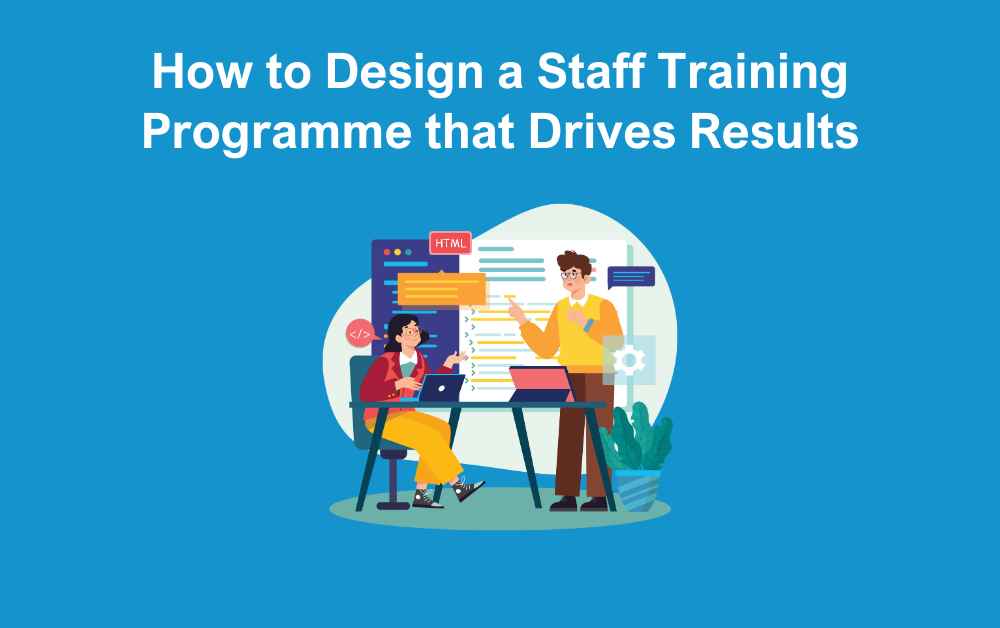Designing a staff training programme isn’t just a box-ticking exercise. It’s a vital strategy for improving performance, boosting employee engagement, and staying competitive in today’s fast-changing business landscape. For UK employers, ensuring your training efforts deliver real results means going beyond generic sessions and instead focusing on tailored, outcome-driven development that aligns with your goals.
In this guide, we’ll walk you through how to design an effective staff development courses. Whether you’re a small business navigating new compliance requirements or a growing company looking to upskill your workforce, this step-by-step approach will help you get the most out of your training investment.
Steps to create a training plan that fits your business needs
Understand Your Business Goals
Your staff training programme should be aligned with your business goals. What strategic objectives do you have? Do you want to prioritise growth? Is compliance an issue? Do you want to improve customer service within your business. Once you have narrowed this down, you will then have a development strategy that will drive results for your business.
Assess Training Needs
Before investing time or money in any training plan, it’s essential to identify where the real gaps lie. A common mistake employers make is jumping straight into course delivery without fully understanding what their team actually needs. Taking a strategic approach to training needs analysis ensures your programme is targeted, effective, and aligned with both business and individual goals.
How to Identify Training Needs
1. Conduct a Skills Gap Analysis
Start by mapping out the skills and training programme your organisation needs and comparing these against the current capabilities of your staff. This can highlight both short-term gaps (such as a lack of digital skills) and long-term development areas (like leadership readiness).
2. Review Performance Data
Use appraisals, one-to-ones, and KPIs to identify where performance is falling short. For example, frequent customer complaints might point to a need for customer service training, while missed deadlines could indicate time management issues.
3. Ask Your Team
Don’t overlook the value of employee input. Staff often know where they feel less confident or what would help them succeed in their role. Use surveys, focus groups, or even informal discussions to gather insights.
Choose the Right Training Methods
Selecting the most suitable training programme method is key to ensuring your staff not only engage with the learning process but also retain and apply their new knowledge in the workplace. The right approach will depend on your business goals, the skills you’re targeting, and how your team prefers to learn.
Here are some common and effective training methods used by UK employers:
On-the-Job Training
This practical, hands-on method involves employees learning while performing their day-to-day duties. It’s ideal for developing role-specific skills and is especially effective in sectors like hospitality, retail, and manufacturing.
Benefits: Cost-effective, tailored to your business, minimal disruption.
Classroom-Based Workshops
Delivered in person or via video conferencing, these sessions are useful for introducing new concepts, fostering team collaboration, and encouraging open discussion. Partnering with UK-accredited training providers can enhance the credibility of your training programme.
Tip: Consider local training venues or bringing a trainer onsite to keep things convenient for staff.
E-Learning and Digital Courses
Online training platforms allow staff to learn at their own pace, which is particularly useful for remote or hybrid teams. There are many UK-based providers offering compliant and industry-specific modules, including health and safety, GDPR, and leadership skills.
Mentoring and Peer Learning
Pairing less experienced employees with senior team members encourages knowledge sharing and builds strong internal relationships. This can be formalised into mentoring programmes or kept informal depending on your company culture.
Blended Learning
Combining two or more methods – for example, e-learning followed by a practical workshop – gives staff a richer learning experience and caters to different learning styles.
Evaluate and Enhance Your Staff Training Programme
To ensure your staff training programme continues to deliver results, it’s important to regularly evaluate its impact and make improvements. This helps UK employers maximise return on investment, support ongoing development, and stay compliant with relevant standards.
How to Measure Training Effectiveness
1. Gather Employee Feedback
Use surveys or quick check-ins to ask staff what worked well, what didn’t, and how confident they feel applying the learning.
2. Monitor Key Metrics
Look at performance indicators such as productivity, customer satisfaction, error rates or staff retention before and after training.
3. Link to Business Goals
Has the training helped achieve specific outcomes, such as better compliance, improved service, or increased sales?
Continuous Improvement Tips
-
Update training content regularly (especially after UK law or policy changes)
-
Adapt delivery methods (e.g. in-person, online, or blended)
-
Offer refresher sessions or ongoing support
-
Align future training with performance reviews and business growth plans
By evaluating the training programme regularly and acting on the results, you’ll build a more effective, responsive staff development course that keeps pace with your team’s needs and the demands of the UK workplace.
Management Training with The HR Booth
We deliver a wide range of management training courses to businesses throughout the UK to help inform staff and develop skills where needed. Popular courses we deliver include:
- Sexual Harassment Training
- An introduction to Mental Health and Wellbeing
- Customer Service
- Equality and Diversity
- Handling Difficult Conversations
- How to attract and retain talent
- How to conduct effective investigations and disciplinary hearings
- How to manage grievances
You can take a look at the full list of courses we deliver on our website.
Contact Us
If you would like help to create a staff training programme that drives results in your business, contact our HR Consultants today. We look forward to hearing from you and supporting you in any way we can.







